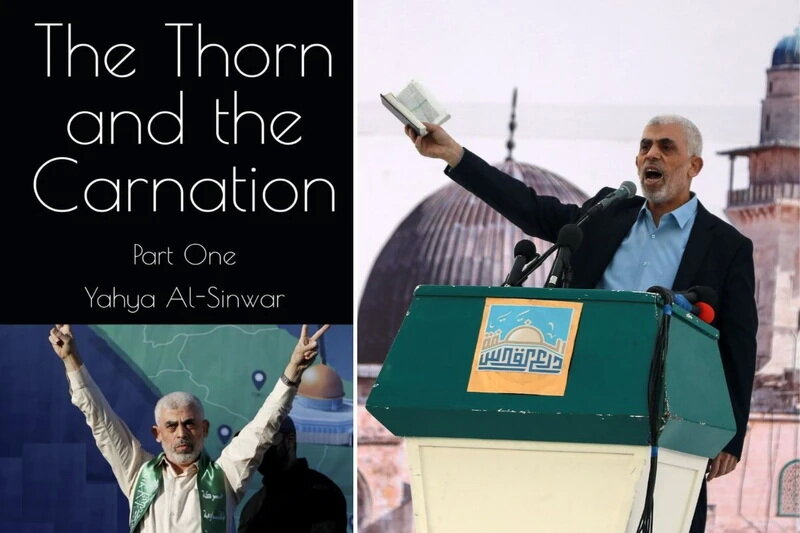Sinwar’s novel “The Thorn and the Carnation” to be published in Persian

TEHRAN- A Persian translation of martyred Hamas Leader Yahya Sinwar’s novel “The Thorn and the Carnation” will be published in Iran.
Translated by Hanieh Kamari, the book will soon be published by Soore Mehr Publication in Tehran.
Written during Sinwar’s lengthy incarceration in Israeli prisons, “The Thorn and the Carnation” offers an intimate portrayal of the struggle and endurance of Palestinian people.
The book effectively blends fact and fiction to chronicle the Palestinian resistance from the aftermath of the 1967 Arab-Israeli war, reflecting on themes of loss, perseverance, and hope amid the stark realities of occupation.
The novel opens with the heart-wrenching martyrdom of the protagonist’s father and uncle, victims of Israeli soldiers. Sinwar’s narrative skillfully sheds light on the psychological and emotional burdens borne by these families, utilizing rich imagery to depict the indomitable spirit of the Palestinian people. The protagonist’s quest for justice represents a larger struggle—a fight not only against oppression but also for identity, dignity, and rights.
Among the book’s most striking portrayals is the depiction of life in a Gaza prison, famously known as "the slaughterhouse." Sinwar describes harrowing scenes of torture and degradation, illustrating a system designed to break individuals rather than bodies.
Detainees are subjected to a variety of brutal tactics, including suffocation, beatings, and relentless psychological torment. Through these grim realities, Sinwar reveals the resilience that emerges in the darkest of times. Herein lies a poignant reminder of the human cost of conflict—a theme that reverberates throughout the narrative.
Sinwar’s reflections resonate particularly when he exposes the conditions of administrative detention, where inmates are crammed into cramped quarters, deprived not only of freedom but also of basic human rights. In these dire circumstances, hunger strikes become a desperate act of defiance; prisoners endure starvation to reclaim their dignity and to demand the fundamental rights that have been systematically denied to them. This depiction of suffering is not merely for dramatic effect—it serves as a testament to the strength and resolve of those who refuse to submit to a regime of oppression.
Moreover, the novel explores the insidious methods employed by the Israeli intelligence apparatus. Sinwar illustrates how the occupier infiltrates Palestinian communities, coercing individuals into becoming informants through threats or violence. This betrayal not only undermines the spirit of the resistance but also highlights the broader societal fractures caused by prolonged occupation. The tactical use of addiction and economic desperation serves not only as a control mechanism but as a grim narrative of exploitation that many Palestinians face.
Despite the pervasive violence and control, Sinwar emphasizes the unwavering commitment to education among Palestinians. During a time when Gaza lacked its own university, the Islamic University of Gaza emerged from the efforts of dedicated students who, against all odds, sought knowledge and empowerment. Among them is the character Ibrahim, modelled on Palestine Liberation Organization members and Hamas’s founder, Sheikh Ahmed Yassin. Ibrahim transforms from a student activist into a builder, demonstrating the unyielding determination of the youth to rise above occupation and claim their future. The institution becomes a symbol of resistance itself—a bastion of hope amidst the rubble of despair, where camaraderie is galvanized through both academic and political struggles.
Sinwar's narrative is imbued with a profound sense of longing—a yearning for freedom encapsulated in the symbolism of carnations. These delicate flowers, often associated with fleeting moments of joy, stand juxtaposed against a backdrop of enduring hardship. The contrasting imagery serves as a powerful reminder of the resilience embedded within the Palestinian spirit, as individuals grapple with personal and collective trauma while clinging to the hope for liberation.
Notably, Sinwar does not shy away from the complexities of the Palestinian political landscape. He delves into themes of betrayal and conflict within resistance factions, capturing the intricate dynamics of cooperation and division among various Palestinian groups. The importance of unity in the face of a common adversary emerges as a critical theme, revealing that, despite their differences, Palestinians are bound by a shared desire for justice and self-determination.
Sinwar’s literary prowess transcends mere political narrative, offering an intimate and humanizing portrayal of life under occupation. By focusing on individual stories of suffering and resilience, he connects with readers on an emotional level, allowing them to grasp the depth of the Palestinian experience beyond the headlines.
Sinwar’s insights, garnered from personal experience and a diligent study of Israeli strategies, infuse depth into the narrative, making it a compelling blend of history, pain, and hope.
In July, Yahya Sinwar ascended to the leadership of Hamas as its political chief following the assassination of his predecessor, Ismail Haniyeh, in an Israeli strike in Tehran. Haniyeh had been actively engaging in international diplomacy aimed at achieving a ceasefire in Gaza since the onset of increased tensions on October 7, 2023. Sinwar is recognized as the architect of the 7 October attack, dubbed Operation Al-Aqsa Storm.
Born in Khan Younis, Gaza, Sinwar earned a BA in Arabic Studies from the Islamic University of Gaza. An early member of Hamas, established by Sheikh Ahmed Yassin in 1987, he became immersed in anti-occupation activism during his university years. Throughout the 1980s, he faced multiple imprisonments, ultimately being sentenced to four life terms in 1988 for his alleged involvement in attacks against Israeli forces.
During his incarceration, Sinwar mastered Hebrew and translated banned autobiographies of former Shin Bet leaders, indicating a commitment to education and preparation for future leadership. Released in 2011 as part of a prisoner exchange deal for Israeli soldier Gilad Shalit, Sinwar quickly rose through Hamas ranks. In 2021, he was re-elected and played a significant role in the Al-Quds Sword war. On Thursday, Israel announced its claim to have killed Sinwar, a statement that was confirmed by Hamas the following day.
SAB/
Leave a Comment